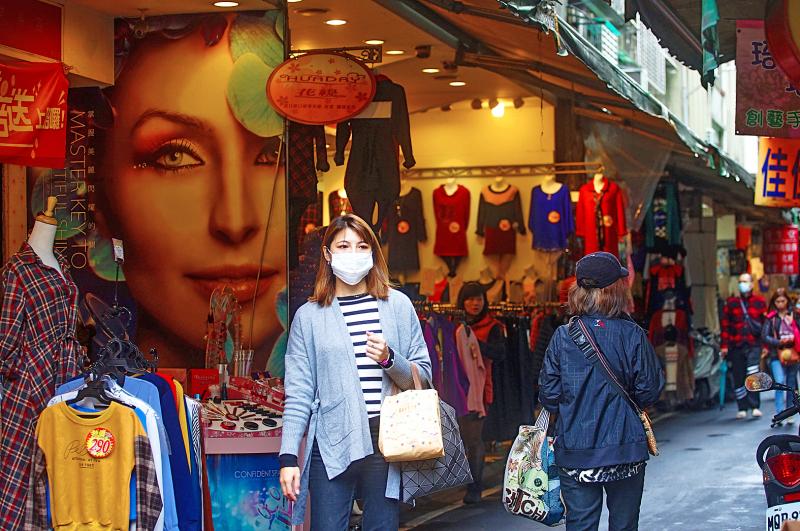The consumer price index (CPI) last month edged up 0.09 percent year-on-year, ending nine months of decline, as prices for food, healthcare and miscellaneous items picked up amid improving demand, the Directorate-General of Budget, Accounting and Statistics (DGBAS) said yesterday.
A slump in crude oil prices, previously the main drag on the index, tapered off, but prices are unlikely to return to positive territory in the short term, the statistics agency said.
Cheaper crude oil prices have meant there has been no need to worry about deflation — a decrease in the prices of goods and services that sees the public postponing purchases, leading to a recession — an agency official said.

Photo: CNA
Lower energy prices are favorable for consumers, giving them more leeway to spend on other items, the official said.
“Cheaper fuel prices, practically or theoretically, is not a cause of deflation... It is even less of a concern now that price declines have narrowed,” the official added.
Prices of miscellaneous items reported the biggest advance of 1.05 percent, lifted by strong demand for gold jewelry and personal accessories, the DGBAS report said.
Imports of gold jewelry surged almost twofold from the previous year, Ministry of Finance trade data showed.
Medicine and healthcare costs rose 0.49 percent as clinics and hospitals raised registration and copayment fees, the report said.
Garment prices gained 0.4 percent, while food costs advanced 0.4 percent after a bad harvest last year lowered the comparison bar, the agency said.
Transportation and communications costs fell 1.48 percent year-on-year, even though airline tickets prices soared 21.71 percent to a 20-year high on the back of low supply and capacity, it said.
Education and entertainment costs fell 0.66 percent from a year earlier as local hotels cut prices to attract customers, it added.
Seasonally adjusted CPI increased 0.35 percent, while core CPI — a more reliable long-term price tracker, as it excludes volatile items — rose 0.78 percent, lending support to stable consumer prices, the agency said.
The wholesale price index (WPI), a measure of production costs, fell 6.22 percent year-on-year, up from a revised 7.41 percent decline a month earlier, the DGBAS said.
Export and import prices of petrochemical and mineral products continued to fall, but base metal prices picked up, it said.
In the first 11 months of the year, the CPI fell 0.26 percent, while the WPI fell 8.07 percent, it added.

SEMICONDUCTORS: The German laser and plasma generator company will expand its local services as its specialized offerings support Taiwan’s semiconductor industries Trumpf SE + Co KG, a global leader in supplying laser technology and plasma generators used in chip production, is expanding its investments in Taiwan in an effort to deeply integrate into the global semiconductor supply chain in the pursuit of growth. The company, headquartered in Ditzingen, Germany, has invested significantly in a newly inaugurated regional technical center for plasma generators in Taoyuan, its latest expansion in Taiwan after being engaged in various industries for more than 25 years. The center, the first of its kind Trumpf built outside Germany, aims to serve customers from Taiwan, Japan, Southeast Asia and South Korea,

Gasoline and diesel prices at domestic fuel stations are to fall NT$0.2 per liter this week, down for a second consecutive week, CPC Corp, Taiwan (台灣中油) and Formosa Petrochemical Corp (台塑石化) announced yesterday. Effective today, gasoline prices at CPC and Formosa stations are to drop to NT$26.4, NT$27.9 and NT$29.9 per liter for 92, 95 and 98-octane unleaded gasoline respectively, the companies said in separate statements. The price of premium diesel is to fall to NT$24.8 per liter at CPC stations and NT$24.6 at Formosa pumps, they said. The price adjustments came even as international crude oil prices rose last week, as traders

Taiwan Semiconductor Manufacturing Co (TSMC, 台積電), which supplies advanced chips to Nvidia Corp and Apple Inc, yesterday reported NT$1.046 trillion (US$33.1 billion) in revenue for last quarter, driven by constantly strong demand for artificial intelligence (AI) chips, falling in the upper end of its forecast. Based on TSMC’s financial guidance, revenue would expand about 22 percent sequentially to the range from US$32.2 billion to US$33.4 billion during the final quarter of 2024, it told investors in October last year. Last year in total, revenue jumped 31.61 percent to NT$3.81 trillion, compared with NT$2.89 trillion generated in the year before, according to

PRECEDENTED TIMES: In news that surely does not shock, AI and tech exports drove a banner for exports last year as Taiwan’s economic growth experienced a flood tide Taiwan’s exports delivered a blockbuster finish to last year with last month’s shipments rising at the second-highest pace on record as demand for artificial intelligence (AI) hardware and advanced computing remained strong, the Ministry of Finance said yesterday. Exports surged 43.4 percent from a year earlier to US$62.48 billion last month, extending growth to 26 consecutive months. Imports climbed 14.9 percent to US$43.04 billion, the second-highest monthly level historically, resulting in a trade surplus of US$19.43 billion — more than double that of the year before. Department of Statistics Director-General Beatrice Tsai (蔡美娜) described the performance as “surprisingly outstanding,” forecasting export growth